
Cecil Day-Lewis, often written as C. Day-Lewis, was an Anglo-Irish poet and Poet Laureate of the United Kingdom from 1968 until his death in 1972. He also wrote mystery stories under the pseudonym of Nicholas Blake, most of which feature the fictional detective Nigel Strangeways.

Spinsters in Jeopardy is a detective novel by Ngaio Marsh; it is the seventeenth novel to feature Roderick Alleyn, and was first published in 1953.
Nigel Strangeways is a fictional British private detective created by Cecil Day-Lewis, writing under the pen name of Nicholas Blake. He was one of the prominent detectives of the Golden Age of Detective Fiction, appearing in sixteen novels between 1935 and 1966. He also features in a couple of short stories.

The Sad Variety is a 1964 thriller novel written by the Anglo-Irish writer Cecil Day-Lewis, written under the pen name of Nicholas Blake. It is the fifteenth and penultimate entry into the series featuring the private detective Nigel Strangeways. It marked a move away from the murder mysteries of the earlier novels into the then-fashionable spy novel genre.
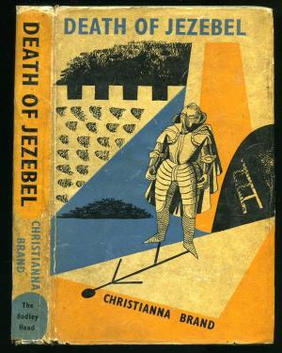
Death of Jezebel is a 1948 mystery crime novel by the British author Christianna Brand. It is the fourth entry in the series featuring the fictional police detective Inspector Cockerill, and sees him working alongside Inspector Charlesworth a character from Brand's debut novel Death in High Heels.

The Dreadful Hollow is a 1953 detective novel by Cecil Day-Lewis, written under the pen name of Nicholas Blake. It is the tenth in a series of novels featuring the private detective Nigel Strangeways.

There's Trouble Brewing is a 1937 detective novel by Cecil Day-Lewis, written under the pen name of Nicholas Blake. It is the third in a series of novels featuring the private detective Nigel Strangeways.

The Worm of Death is a 1961 detective novel by the Anglo-Irish writer Cecil Day-Lewis, written under the pen name of Nicholas Blake. It is the fourteenth in a series of novels featuring the private detective Nigel Strangeways.

End of Chapter is a 1957 detective novel by Cecil Day-Lewis, written under the pen name of Nicholas Blake. It is the twelfth in a series of novels featuring the private detective Nigel Strangeways.

The Widow's Cruise is a 1959 British detective novel by Cecil Day-Lewis, written under the pen name of Nicholas Blake. It is the thirteenth in a series of novels featuring the private detective Nigel Strangeways.

The Morning after Death is a 1966 detective novel by Cecil Day-Lewis, written under the pen name of Nicholas Blake. It is the sixteenth and last entry in the series of novels featuring the private detective Nigel Strangeways.

A Penknife in My Heart is a 1958 crime thriller novel by Cecil Day-Lewis, written under the pen name of Nicholas Blake. It was one of four stand-alone novels he wrote alongside the Nigel Strangeways detective novels.

A Tangled Web is a 1956 British crime novel by Cecil Day-Lewis, written under the pen name of Nicholas Blake. It was one of four stand-alone novels he wrote under the name alongside the Nigel Strangeways detective novels. It was published by Harper in the United States under the alternative title Death and Daisy Bland.
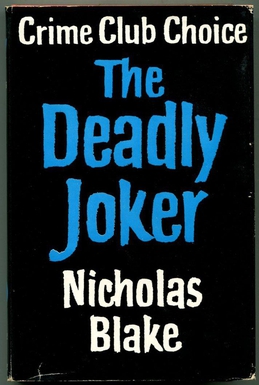
The Deadly Joker is a 1963 mystery novel by the Anglo-Irish writer Cecil Day-Lewis, under his pen name of Nicholas Blake. It was one of four stand-alone novels he wrote under the name alongside the Nigel Strangeways detective novels. It is unusual for the author for being written in a first person narrative from the perspective of the protagonist John Waterson.
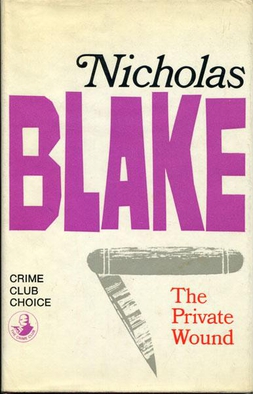
The Private Wound is a 1968 mystery thriller novel by Cecil Day-Lewis, written under the pen name of Nicholas Blake. It was one of four stand-alone novels he wrote alongside the Nigel Strangeways detective novels. The title is taken from a line in William Shakespeare's Two Gentlemen of Verona. It was a runner-up for the Gold Dagger Award of the British Crime Writers' Association.
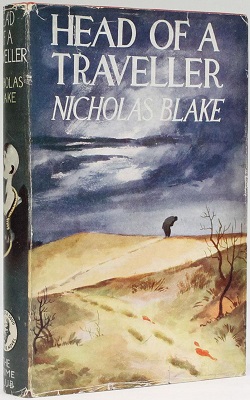
Head of a Traveller is a 1949 detective novel by Cecil Day-Lewis, written under the pen name of Nicholas Blake. It is the ninth in a series of novels featuring the private detective Nigel Strangeways.

A Question of Proof is a 1935 detective novel by Cecil Day-Lewis, written under the pen name of Nicholas Blake. It is the first in a series of novels featuring the private detective Nigel Strangeways. Day-Lewis chose to write under an assumed name as he feared writing in the popular detective genre would harm his growing reputation as a serious-minded poet. Consequently, the publishers Collins advertised the book as being written by a "well-known writer" using a pen name. It was a commercial success selling around 200,000 copies in Britain and launching Day-Lewis, who quickly did become widely identified as the author, as one of the leading writers of the Golden Age of Detective Fiction.

The Beast Must Die is a 1938 detective novel by Cecil Day-Lewis, written under the pen name of Nicholas Blake. It combines elements of the inverted thriller with a classic Golden Age-style investigation. It is the fourth in a series of novels featuring the private detective Nigel Strangeways. The title is inspired by a line in Four Serious Songs by Johannes Brahms, itself a reference to Ecclesiastes.
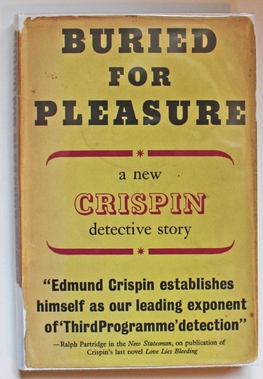
Buried for Pleasure is a 1948 detective novel by the British writer Edmund Crispin, the sixth in his series featuring the Oxford professor and amateur detective Gervase Fen. As with the rest of the Fen novels, a complex Golden Age-style mystery is combined with elements of farce. Fen contests a by-election in rural constituency, but events are rapidly overtaken by a murder case. It features Detective Inspector Humbleby who also appeared in the next novel Frequent Hearses as well as most of the short stories in the series.
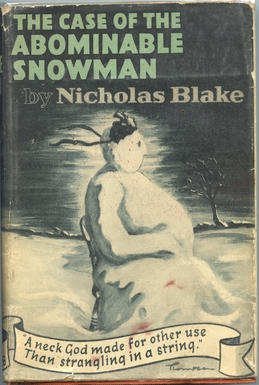
The Case of the Abominable Snowman is a 1941 detective novel by Cecil Day-Lewis, written under the pen name of Nicholas Blake. It is the seventh in a series of novels featuring the private detective Nigel Strangeways. Day-Lewis, best known as a poet, also wrote a number of mysteries during the Golden Age of Detective Fiction. Although in some respects a traditional 1930s country house mystery, it makes passing references to Second World War features such as the blackouts. Although published in 1941, it was written and set in 1940 during the Phoney War era. It was published in the United States under the alternative title The Corpse in the Snowman.



















